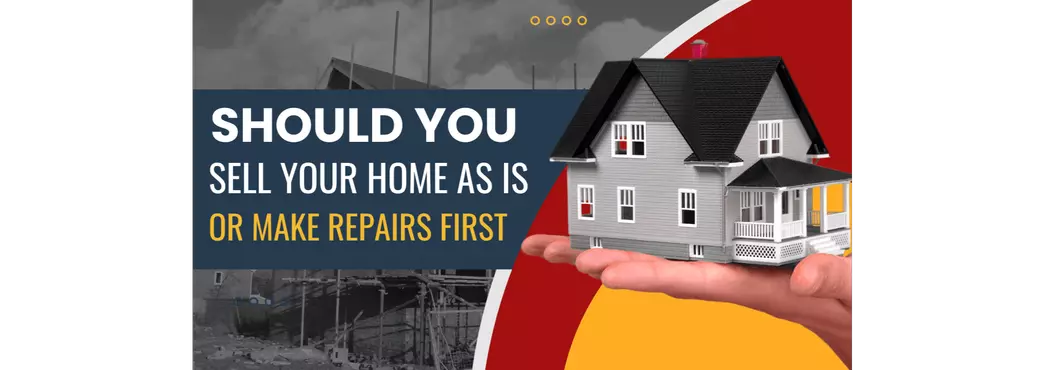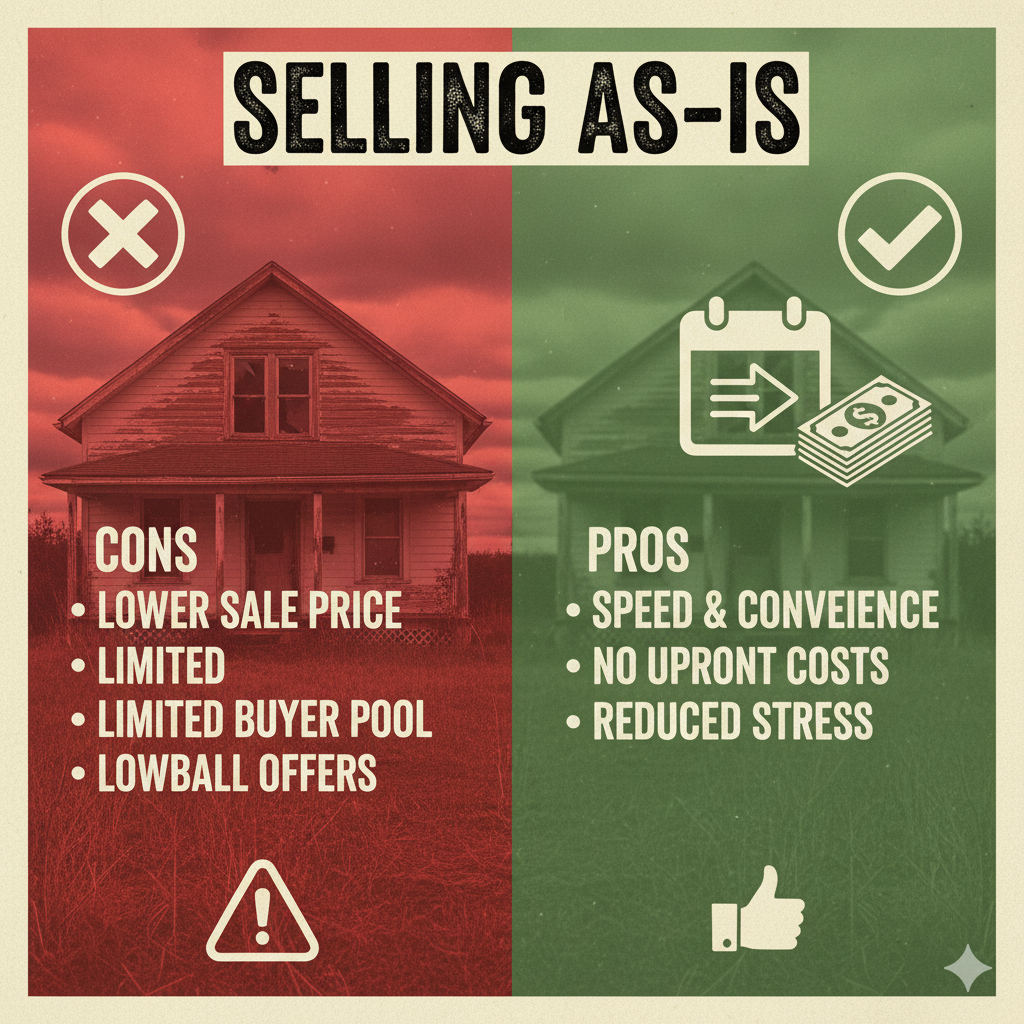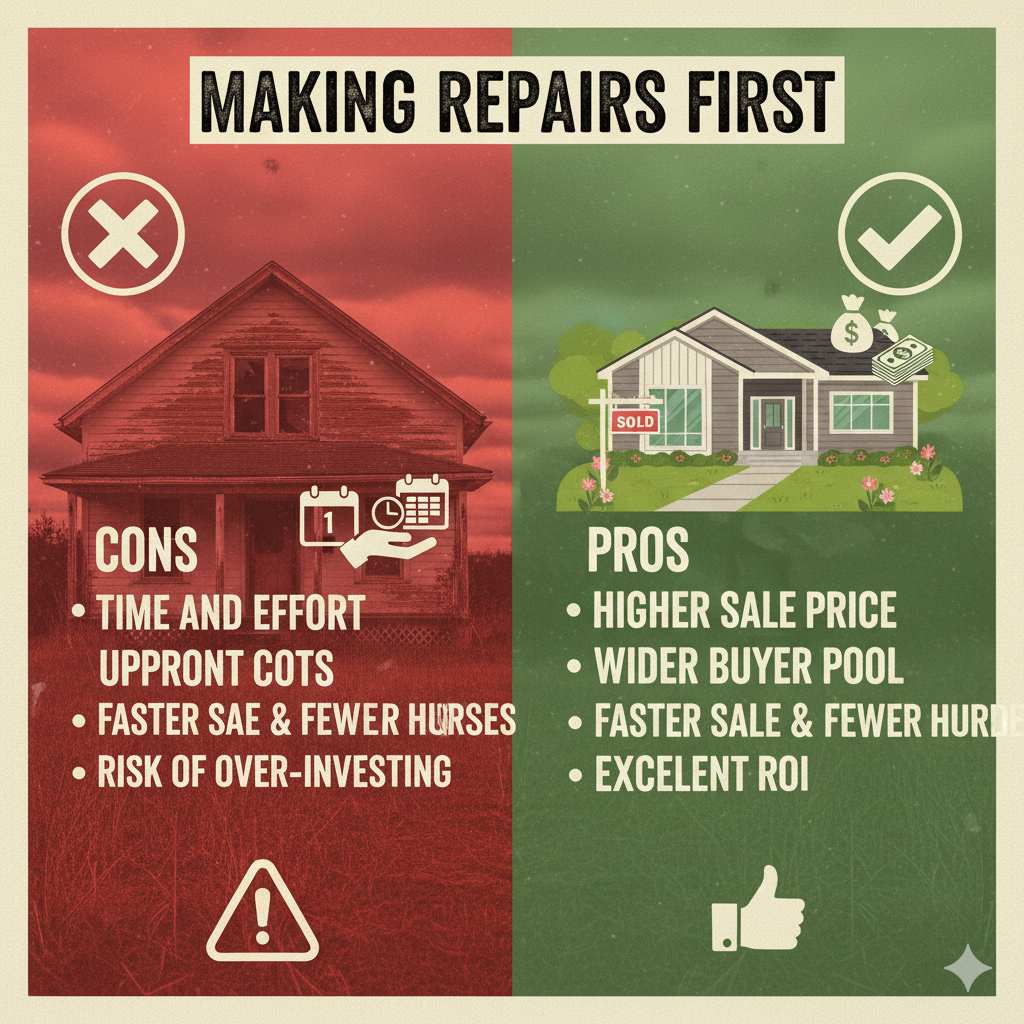Should You Sell Your Home As-Is or Make Repairs First?

You’ve decided to sell your home, but a big question looms: should you put it on the market as-is, or spend the time and money on repairs first? This is one of the most common dilemmas for sellers, and the answer isn't a simple yes or no. The right path depends on your financial situation, your timeline, and the overall condition of your property.
Let's break down the pros and cons of each strategy to help you decide.
The Case for Selling As-Is
Selling a home "as-is" means you are selling the property in its current condition, without making any repairs, upgrades, or cosmetic fixes.
Pros:
- Speed and Convenience: This is the most significant advantage. You avoid the stress, time, and hassle of managing contractors, getting bids, and overseeing a renovation project. You can list your home almost immediately.
- No Upfront Costs: You don’t have to spend a single dime on repairs. This is an ideal solution if you don't have the cash on hand or simply don't want to invest more money into the property.
- Reduced Stress: Avoiding the logistical headaches of a repair project can make the selling process much smoother for you.
Cons:
- A Lower Sale Price: A home sold as-is will almost always fetch a lower price than well-maintained property. Buyers will factor in the cost of all necessary repairs and then subtract even more to account for the risk and effort they will have to put in.
- Limited Buyer Pool: This strategy appeals to a very specific type of buyer: cash investors, house flippers, or seasoned DIY enthusiasts looking for a project. You will likely alienate most conventional buyers who are looking for a ready home.
- Potential for Lowball Offers: As-is sales can attract very low offers, which can be frustrating to negotiate. Buyers assume the "as-is" price is just a starting point and may try to push it even lower.

The Case for Making Repairs First
This strategy involves addressing key issues, from minor cosmetic fixes to more substantial repairs, before putting the home on the market.
Pros:
- A Higher Sale Price: This is the biggest motivator. A well-maintained, polished home is more appealing to buyers and justifies a higher price. It eliminates a buyer's fear of the unknown and reduces their need to factor in future costs.
- Wider Buyer Pool: By fixing issues, you open your home to the largest possible pool of buyers, including those using conventional mortgages who can’t purchase a home with major structural or safety problems.
- Faster Sale and Fewer Hurdles: A home that looks good and is in solid condition is more likely to sell quickly and with fewer issues during the inspection phase. This reduces the chances of a deal falling through.
- Excellent ROI on Strategic Updates: Not all repairs are created equal. High-impact, low-cost fixes like a fresh coat of paint, updated lighting fixtures, or new hardware on cabinets often provide a fantastic return on investment.
Cons:
- Time and Effort: Repairing a home takes time. Depending on the extent of the work, this could delay your listing for weeks or even months.
- Upfront Costs: You need to have the money available to pay for the repairs.
- Risk of Over-Investing: It's easy to get carried away. Major renovations, like a full kitchen remodel, may not provide a dollar-for-dollar return in your specific market. It’s crucial to focus on smart, high-ROI updates rather than your personal dream renovations.

How to Make Your Decision
To figure out which path is right for you, ask yourself these questions:
- What is my timeline? If you need to sell very quickly, an as-is sale is likely your best option.
- What is my budget? If you don’t have the funds to make necessary repairs, selling as-is may be your only choice.
- What is the condition of my home? Is it just cosmetic wear and tear, or are there major structural problems like a leaky roof or a failing foundation? Minor fixes are almost always worth the effort. Major ones require careful consideration.
- What are my local market conditions? A seasoned real estate agent can tell you if your market is currently favoring move-in ready homes or attracting investors looking for fixer-uppers.
The best approach is to consult with a local real estate agent. They can walk through your home, provide an honest assessment, and give you a detailed analysis of which repairs will offer the best return on investment for your specific market.
Recent Posts











"My job is to find and attract mastery-based agents to the office, protect the culture, and make sure everyone is happy! "


